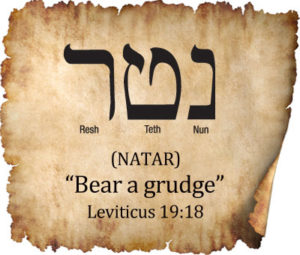HEBREW WORD STUDY – BEAR A GRUDGE – NATAR נתר
Leveticus 19:18: “Thou shalt not avenge, nor bear any grudge against the children of thy people, but thou shalt love thy neighbour as thyself: I [am] the LORD.”
 We are all familiar with the commandment to love your neighbor as yourself. But this commandment is two-fold. Yes, we are to love our neighbors as ourselves, but we are to not avenge or bear a grudge against our own people is ‘am which means a kinsman or a relative. The word for neighbor is ra’ which is used for a fellow citizen or friend.
We are all familiar with the commandment to love your neighbor as yourself. But this commandment is two-fold. Yes, we are to love our neighbors as ourselves, but we are to not avenge or bear a grudge against our own people is ‘am which means a kinsman or a relative. The word for neighbor is ra’ which is used for a fellow citizen or friend.
In verse 17 we are commanded to not hate our brother and then in verse 18, it takes it further that we are not to seek revenge or bear a grudge. Revenge is naqam which means to punish or retaliate for a wrong. We are not to bear a grudge which is natar in the Hebrew. The word natar has the idea of cherishing an anger, guarding that anger or nurturing that anger.
It seems a grudge and revenge are almost the same things but I read in the Talmud this morning in Yoma 23a where the distinction was illustrated. A man asks a second man to borrow his sickle and the second man says: “No.” Then the next day the second man goes to the first and asks to borrow his ax. The first man will answer: “No, because you would not loan me your sickle.” That is vengeance or getting revenge. Now say a man asks a second to borrow his sickle and the second man says: “No.” Then the next day the second man asks to borrow the first man’s ax and the first man replied: “Here it is, I am not evil like you who would not lend to me.” That is bearing a grudge.
Simply, revenge is acting upon your anger and bearing a grudge is holding your anger in. Both, however, are birth with anger. So what is anger? If a man cheats on his wife she gets angry. What is she feeling, hurt, rejection, betrayal, fear, and many other emotions. Anger is not a single emotion but a combination of emotions. It is said that when you are around an aggressive dog, do not show fear. The reason is that anger is really an inward expression of fear. When you show fear to a dog, he cannot interpret the difference between fear and aggression because anger is not a single emotion that he can interpret. So he defaults on to aggression. When you are really just fearful, he interprets that as a threat and will act accordingly to defend himself.
The opposite of faith is fear. If you had complete, total faith in God, you would never be fearful. You would hold that confidence that God has everything in control, even in the face of death. You fear death because you don’t know what lies after death. If you had total confidence you would be in the arms of Jesus after death, you would not fear death. This is why so many who have had a near-death experience are not fearful of death for they know what lies beyond. But when we have not had such an experience there always lies that question in the back of your mind. If you have complete, total faith in God that would remove that fear. So it would stand to reason that the best way to conquer your fears would be to grow in your faith in God.







Thank you very much for these wonderful studies
Thank you so much for your efforts in rightly dividing the Truth of the Word. I enjoy the insight, you bring in these word studies.
Thank you
Thankyou and may God Bless your site and all the lessons you send daily . I look forward to each lesson and stories .
OUTSTANDING. Explains a lot and gives me understanding and direction. I thank and bless you
Have been praying through the Psalms in 106 : 15 what is the root of leaness? I feel it is not sickness in body as most translate use but a deeper Lebanese of our spirits which is much worse to me do you have insight into this is will not leave .me just want to interrupt corrects thank you I so have been blessed by you books and the daily insights